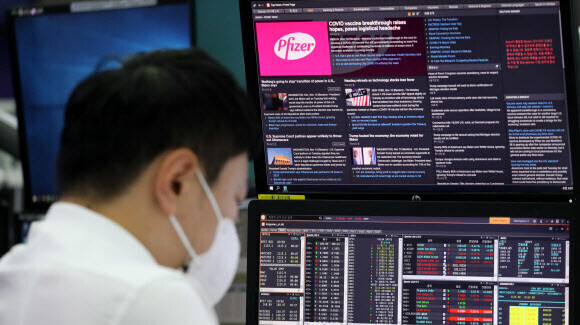hankyoreh
Links to other country sites 다른 나라 사이트 링크
Korean won strengthens amid a weak US dollar

A clear trend of strength has emerged with the South Korean won as exchange rates have fallen. On Nov. 11, the won-to-US dollar exchange rate reached a 23-month low of 1,110, with some observers predicting it could fall below 1,000 in the near future. While it went up 4.8 won on Nov. 12, the prevailing forecast is that the decline will continue.
The strength of the won stems from the weakness of the dollar — a climate that has been intensifying since Democratic Party candidate Joe Biden’s interim victory in the US presidential election. Anticipation of large-scale expansionary measures has led to a decline in the dollar’s value. This has been the backdrop of the strength of currencies in emerging economies, including South Korea.
According to a report on international financial and foreign exchange market trends since October published by the Bank of Korea (BOK) on Nov. 12, the JP Morgan Emerging Market Currency Index (EMCI) had risen by 2.6% from its late September level as of Nov. 10. This translated into an increase in the currency values of the 10 countries reflected. The Mexican peso had the biggest rise in value at 8.8%, followed by the South African rand at 7.0%, the Indonesian rupiah at 5.9%, and the South Korean won at 4.9%.
“With the ongoing weakness of the dollar and strength of the yuan, the won-at-dollar exchange rate has continued to decline amid expectations of economic recovery due to relatively positive economic indicators [growth rates and current account surplus conditions],” BOK explained. According to this explanation, the value of South Korea’s currency has risen because of the relative soundness of South Korea’s economic situation.
Chun Kyu-yeon, a senior analyst with Hana Financial Investment, explained, “The won [exchange rate] has been declining amid a combination of the US dollar’s weakness and the yuan’s strength.”
“This is a reflection of anticipation of support measures in the wake of the US presidential election, as well as trends of economic recovery in South Korea and China,” Jeon said.
Kwon Ah-min, an analyst with NH Investment & Securities, said, “Since September, the won has ranked among the strongest of the major economy currencies.”
“If we take the fiscal deficit keynote after the US presidential election into account, along with additional economic support policies and the collective recovery of the global economy, the trend of weakness in the dollar is very likely to continue,” Kwon predicted. Lending further weight to these predictions are trends of increase in domestic exports and the current account surplus. Kim Hyo-jin, an economist with KB Securities, predicted, “The won will remain strong next year based on the strength of the yuan and a recovery in exports.”
Some variables include the potential intervention of foreign exchange authorities and uncertainties surrounding the global economy. With the rapid strengthening of the won, export-based businesses and others have been calling for efforts to slow the pace, which could lead to the brakes being thrown on an additional decline. The prior reflection of expectations for Biden’s election have also been mentioned as a variable. Kim Hyo-jin said, “If you factor in the reaction against the recent rapid rise of the won and the climate with the Chinese government’s efforts to slow the pace of the yuan’s strengthening, the recent strengthening could be reversed to some extent.”
By Kim Young-bae, staff reporter
Please direct comments or questions to [english@hani.co.kr]

Editorial・opinion
![[Editorial] Yoon must halt procurement of SM-3 interceptor missiles [Editorial] Yoon must halt procurement of SM-3 interceptor missiles](https://flexible.img.hani.co.kr/flexible/normal/500/300/imgdb/child/2024/0501/17145495551605_1717145495195344.jpg) [Editorial] Yoon must halt procurement of SM-3 interceptor missiles
[Editorial] Yoon must halt procurement of SM-3 interceptor missiles![[Guest essay] Maybe Korea’s rapid population decline is an opportunity, not a crisis [Guest essay] Maybe Korea’s rapid population decline is an opportunity, not a crisis](https://flexible.img.hani.co.kr/flexible/normal/500/300/imgdb/original/2024/0430/9417144634983596.jpg) [Guest essay] Maybe Korea’s rapid population decline is an opportunity, not a crisis
[Guest essay] Maybe Korea’s rapid population decline is an opportunity, not a crisis- [Column] Can Yoon steer diplomacy with Russia, China back on track?
- [Column] Season 2 of special prosecutor probe may be coming to Korea soon
- [Column] Park Geun-hye déjà vu in Yoon Suk-yeol
- [Editorial] New weight of N. Korea’s nuclear threats makes dialogue all the more urgent
- [Guest essay] The real reason Korea’s new right wants to dub Rhee a founding father
- [Column] ‘Choson’: Is it time we start referring to N. Korea in its own terms?
- [Editorial] Japan’s rewriting of history with Korea has gone too far
- [Column] The president’s questionable capacity for dialogue
Most viewed articles
- 1Months and months of overdue wages are pushing migrant workers in Korea into debt
- 2Trump asks why US would defend Korea, hints at hiking Seoul’s defense cost burden
- 3[Editorial] Yoon must halt procurement of SM-3 interceptor missiles
- 4At heart of West’s handwringing over Chinese ‘overcapacity,’ a battle to lead key future industries
- 5[Guest essay] Maybe Korea’s rapid population decline is an opportunity, not a crisis
- 6Fruitless Yoon-Lee summit inflames partisan tensions in Korea
- 7First meeting between Yoon, Lee in 2 years ends without compromise or agreement
- 8Under conservative chief, Korea’s TRC brands teenage wartime massacre victims as traitors
- 9Dermatology, plastic surgery drove record medical tourism to Korea in 2023
- 10[Column] Park Geun-hye déjà vu in Yoon Suk-yeol